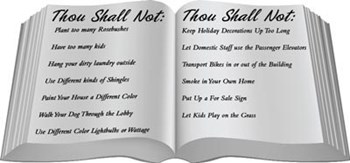
Condos and homeowner associations have made headlines over the years for passing all kinds of overreaching and downright silly rules and regulations—everything from forbidding the flying of the American flag to having prohibitions about hanging laundry outdoors, to discriminating against their own residents—even stopping kids from playing ball or riding their bikes in their own yards. It might sound like something out of a political satire, or items from a humorous ‘News of the Weird’ newspaper column, but these stories of some boards going too far are true, and we've collected some of the silliest, most unusual or most outrageous HOA rules ever passed.
The Ugly Truth
Did you hear the one about the Florida family that was about to be kicked out of their HOA because the wife had just had twins? The family already had one child, and the arrival of the twins would put them over the two-kids-per-unit allowed by their North Palm Beach condo. The condo was not an ‘active adult’ 55-and-over community, but nevertheless it had a rule on the books limiting occupancy to two children. A bit Machiavellian to be sure, but true.
Or how about the Fort Myers condo that fined a man suffering from ALS $100 a day because he was using a shopping cart instead of a walker to get around his unit, the parking area and the grounds? Apparently the community had a rule forbidding the use of any ‘storage item’ in a common area like a walkway.
Another Sunshine State condo passed a rule preventing two unmarried people from living together, aimed at stopping gay couples from living in the development. After an uproar about the ban, the rule was reversed earlier this year.
Or take the case of a Long Beach, California woman who needed to use a cane, and kept a cocker spaniel as a companion animal. Her HOA banned her from walking the dog through the lobby, because they had a rule that all pets had to be carried so their little paws wouldn’t touch the floor. (Good thing she didn’t have an English sheepdog.) She was fined $25 a day and racked up hundreds of dollars in fines before she finally gave up and moved from the building.
It’s Perfectly Legal …
Yes, a co-op, condo or HOA board is legally allowed to administer their own rules and regulations—all for the unique privilege to live in such a community. Under the business judgment rule, courts have given boards of trustees wide discretion in passing rules that they feel are in the best interest of everyone in the community—as long as it’s done in good faith.
Many HOAs routinely have a list of approved exterior paint colors: they can tell you what color to paint your fence or your deck, what type of plants or landscaping you can have, what type of trees and shrubs are permissible. They can limit commercial vehicles parked in your own driveway, or require that cars and other machinery not be visible from the street if it’s an eyesore. They can restrict certain types of signage, even real estate signs.
What’s a Well-Meaning Board to Do?
Experts are pretty much in agreement that the best advice before taking any action to pass a new rule is to consult your legal team to make sure it’s enforceable and unlikely to result in litigation. Also remember that many rules—no matter how outlandish they may sound—may indeed be warranted and have a purpose in addressing an issue the co-op, condo or HOA is facing.
“The single best thing board members can do is to speak with their association attorney first before spending time drafting or adopting rules,” advises Donna DiMaggio Berger, a shareholder attorney with the law firm of Becker & Poliakoff in Fort Lauderdale, Florida. “It is important to understand that certain restrictions simply cannot be passed by board rule alone. Other times, there is a provision in the governing documents which requires membership approval for some or all board rules,” she says.
Many condos/HOAs around the country have in their governing documents provisions requiring anywhere from a simple majority to 75 percent approval before any bylaws, rules, or house rule provisions can be amended.
Berger also states that you should do your due diligence in researching the issue to make sure the rule you’re passing is warranted and does not cause any problems down the road.
“Lastly, you want to make sure that a contemplated rule does not contradict another provision in the governing documents or in the pertinent statutes, that it is properly passed and that the members are properly notified of its existence. Boards should spend 95% of their time identifying the problem and 5% crafting the solution via rule. Unfortunately, most approach the issue in the reverse order,” Berger says.
Attorney Stephen Marcus, a partner with the law firm of Marcus, Errico, Emmer & Brooks, P.C., in Braintree, Massachusetts, also has heard about his share of questionable rules. Although it happened some time ago, he says, “there was a condo association in Massachusetts that decided they would require unit owners to essentially carry their 60 pound pet dogs over the common areas; it wasn’t well received by the courts. The good news was, it was a long time ago; I haven’t heard one of those cases in quite a while….but it was something that was an issue for a while.”
Bad Moon Rising
In counseling hundreds of condominium, cooperative, timeshare, mobile home and homeowner associations throughout Florida since 1992, Berger has seen her share of unusual rules. Here’s one that she particularly remembers. “One of the craziest rules I ever came across was one which made me wonder what prompted its passage in the first place. It was a rule in a rather placid HOA which prohibited nudity in their common areas.”
It’s not surprising that many of the more controversial rules emanate from Florida associations. When asked about that, Berger says that it is due to the Sunshine State’s large number of community associations and HOAs. The problem, however, exists, no matter what region of the country or municipality you are located in, she notes.
Attorney Steven Goldman of the Manhattan-based law firm of Kurzman Eisenberg Corbin & Lever, LLP, says that what some might consider an unreasonable rule might have reasonable intent behind it, and Marcus concurs.
“There are some rules that sound crazy, usually created to fine someone, that have some purpose behind them,” says Marcus. “For example, some towns are only served by septic systems, and putting the wrong things down the drain, or flushing the wrong things, or even having garbage disposals, can lead to premature destruction of the equipment. Septic systems are very expensive, so some associations institute large fines—$1,500 a day, or $2,000 a day—but at least it relates to what the possible repair cost might be if the system went down because of inappropriate use. It sounded crazy, but if you looked at it, it probably wasn’t as crazy as you’d think,” he says.
Some instances might be warranted. Take carrying a pet through the lobby. A co-op or condo board might have just spent $600,000 on redoing the lobby, putting in carpeting and other improvements—therefore the rule might have merit, he says. The board may require taking the pet through the basement or the back entrance instead of the lobby, and that is not all that crazy.
“It’s two-fold; number one, there’s a lot of traffic in the lobby and you never know how a pet’s going to react, but more so they don’t want the pet to relieve itself,” according to Goldman. “It may seem silly but there is some intent.”
Same thing with elevators; you cannot bring a pet in through the elevator, as one Massachusetts condo tried to enact. One board that was told by their attorney that they had to allow emotional support animals tried to regulate it.
“It was a high-rise building,” says Marcus, “so they wanted to make a rule that if you were on, say, the 20th floor and you took your cat or dog down in the elevator, and at the 17th floor, someone else got on, you would have to get out of the elevator and wait for one that was empty; and maybe it took you to the 13th floor or 12th floor, and somebody else got on, so you’d have to get out of the elevator again. I think they were convinced not to enact the rule—but they at least thought about it, and would have enacted it had their attorney not advised them that it wasn’t a great idea.”
War of the Roses
Here are some more actual condo/HOA rules from around the country:
An HOA in Texas has two garage sales a year, and they’ve passed a dress code for certain neighborhood activities. So at garage sales, community gatherings, swim parties, etc., residents and guests have to be attired appropriately. For garage sales, they must wear polos and khakis (with a $30 fine for non-compliance); members cannot share towels at the swimming pool, even if you bring your own for your family ($25 fine); you must remove holiday decorations within three days of the end of the holiday ($50 fine); and, you cannot use a different color light bulb unless approved by the HOA ($25 fine).
A Rancho Sante Fe, California man was hit with a lawsuit by his condominium because he exceeded the number of rose bushes he was allowed to plant on his four-acre property. The HOA levied multiple fines, took the resident to court and ultimately won. The man had to pay the HOA’s $70,000 legal bill, and lost his home to the bank in a foreclosure action.
A sad story is that of a Sanford, Florida homeowner who lost his wife and infant son when a plane crashed into their home. The HOA fined him during the reconstruction for using shingles that didn’t perfectly match that of his neighbor’s homes.
A New York City condo in the hip SoHo neighborhood that caters to artists and creative types wanted to be sure that their residents were sufficiently talented before being allowed to buy into the building. So they decided to not only screen residents, but their craft too.
Consider Mediation and Enforcement
Little things can escalate, as any attorney will tell you. Before making matters worse and having your community’s dirty laundry hung out to dry in the local and national news, community association and HOA boards should try to defuse a headline-grabbing news story before it becomes news. Seeking mediation, imposing reasonable fines, and compromising with the parties involved are all avenues to consider, the experts say.
Rules should be fair and fairly applied, says Berger. Boards should first ensure that the rules they wish to enforce pass the reasonableness test and that they are being applied consistently and uniformly, she says.
Marcus suggests two courses of action. “Two things: one is they probably should be reviewed by the attorney for the association with an eye toward whether it would be looked at as unrealistic, unenforceable or illegal. And two, it’s never a bad idea to have at least a letter to the owners, if not a meeting with the owners, to discuss it, so you have a better feel for what the feel of the community is about the rule you are looking to adopt,” he says.
And follow due process, Marcus advises. “Before enforcing a rule, it goes to the unit owners and gets reviewed by the attorney; that gives certain protections. Some associations do a due process hearing where the unit owner gets to speak and present evidence why they think the rule is unreasonable and shouldn’t be enforced against them; all those add to a more likely possibility that you’re going to hear the complaint about the rule from the unit owners before you start proposing fines. Starting with a sit-down, whether formal or informal, to hear the unit owner side of things, is sometimes a good way of resolving disputes. Sometimes just getting people face to face is a good way of resolving disputes.”
Don’t be swayed by any threats or show favoritism to one homeowner or shareholder over another. Boards have a fiduciary duty to act in the best interests of the co-op, condo or homeowners association that they represent.
Rules do help, says Marcus. “There’s probably a split of opinion on conformity, at least in terms of the aesthetics of the community. But I think most documents are written with fairly strict requirements relating to the general uniformity in terms of color, and size and all that. There are those who believe it makes for a better community. There are some, probably in the minority, who believe that giving freedom of expression to homeowners is a better idea. And there are still plenty of boards that will make exceptions during the holiday season for holiday decorations, even though they might not be allowed otherwise,” he says. However, as a board you have to be reasonable, and not look for ways to fine arbitrarily, he says.
Protect Your Community
“Don’t forget it’s a community,” adds Goldman, “and as such, you’re really trying to maintain a level of appearance, a level of aesthetics. The best way to describe it is that people live in a suburban development and people on either side have gorgeous lawns and one in the middle has weeds all over the place. No matter what, that affects the value of the properties going on next door.”
Berger puts it quite succinctly. “One of the main reasons most purchasers buy in a private residential community governed by a mandatory association is that they expect the covenants and restrictions to be enforced much more quickly and consistently than would happen in a neighborhood subject only to county and city codes and ordinances,” says Berger. “There is a general expectation in private communities that one will not find unkempt lawns, cars on cement blocks, high crime rates and a myriad of other negative factors that can be controlled by reasonable rules, which are properly enforced.”
Debra A. Estock is executive editor of New England Condominium.






2 Comments
Leave a Comment